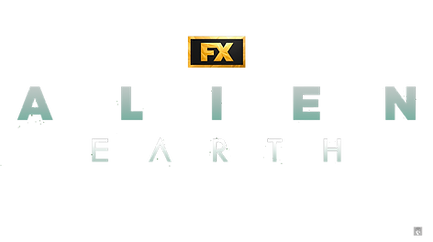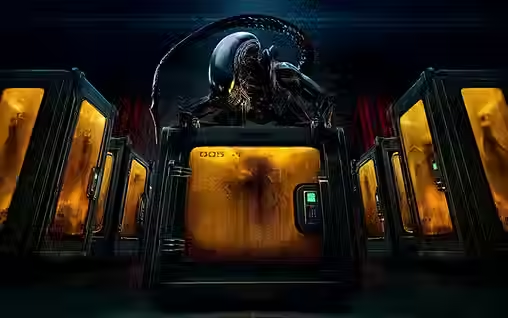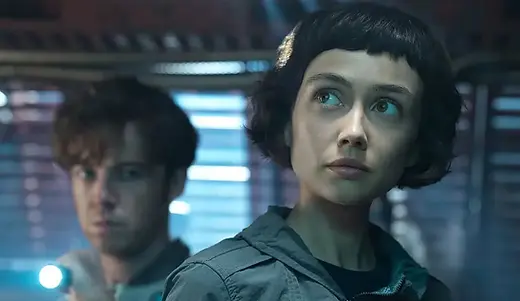

When the mysterious deep space research vessel USCSS Maginot crash-lands on Earth, “Wendy” (Sydney Chandler) and a ragtag group of tactical soldiers make a fateful discovery that puts them face-to-face with the planet’s greatest threat in FX’s Alien: Earth.
In the year 2120, the Earth is governed by five corporations: Prodigy, Weyland-Yutani, Lynch, Dynamic and Threshold. In this Corporate Era, cyborgs (humans with both biological and artificial parts) and synthetics (humanoid robots with artificial intelligence) exist alongside humans. But the game is changed when the wunderkind Founder and CEO of Prodigy Corporation unlocks a new technological advancement: hybrids (humanoid robots infused with human consciousness). The first hybrid prototype named “Wendy” marks a new dawn in the race for immortality. After Weyland-Yutani’s spaceship collides into Prodigy City, “Wendy” and the other hybrids encounter mysterious life forms more terrifying than anyone could have ever imagined.
Led by Chandler, the series showcases an expansive international cast, which includes Timothy Olyphant (“Kirsh”), Alex Lawther (“Hermit”), Samuel Blenkin (“Boy Kavalier”), Babou Ceesay (“Morrow”), Adrian Edmondson (“Atom Eins”), David Rysdahl (“Arthur Sylvia”), Essie Davis (“Dame Sylvia”), Lily Newmark (“Nibs”), Erana James (“Curly”), Adarsh Gourav (“Slightly”), Jonathan Ajayi (“Smee”), Kit Young (“Tootles”), Diêm Camille (“Siberian”), Moe Bar-El (“Rashidi”) and Sandra Yi Sencindiver (“Yutani”).
FX’s Alien: Earth is created for television and executive produced by Peabody and Emmy® Award-winning Noah Hawley. Ridley Scott, David W. Zucker, Joseph Iberti, Dana Gonzales and Clayton Krueger also serve as executive producers. Alien: Earth is produced by FX Productions.
REVIEW BY: Kurt Morrison - 4/9/25
"FX’s "Alien: Earth” premieres with two episodes on Tuesday, August 12
at 8pm ET on FX and on Disney+ in Canada."
FIRST LOOK REVIEW - 6 Episodes - Darren Zakus
Alien: Earth expands the beloved horror franchise to our planet with a brilliant evolution of the series’ hallmarks, giving way to more compelling and captivating thematic explorations of technology, corporate greed and humanity, alongside nasty and violent alien kills that will have audiences both terrified and eagerly anticipating what showrunner Noah Hawley has in store.
The Alien franchise has been proving for decades that no one can hear you scream in space since Ridley Scott’s original horror masterpiece debuted on the big screen in 1979. Making its big screen return in last year’s critically acclaimed and financially successful entry, Alien: Romulus, fan interest in the franchise was reignited and primed audiences for the debut of Noah Hawley’s long in development Alien television series this summer: Alien: Earth. Hawley, best known for creating FX’s Fargo adaptation, takes his undeniable skills as a storyteller and sets his sights on the ideas and themes of Scott’s films in the series (including Prometheus and Alien: Covenant), slowly developing them with a freedom and breadth that can only be achieved in the long form episodic format. In doing, Hawley not only pays tribute to the iconic beginnings of the franchise, but creates an enthralling science fiction horror spectacle of big ideas, wonderful character development, exceptional production design and visuals, and above all else, blood soaked terror that gives a more than worthy small screen debut for the xenomorphs.
RATING: 4 OUT OF 5 STARS

As one of the most influential horror films of all time, there is a DNA to the Alien world, and Hawley’s production pays great homage to Scott’s original work. From the designs of the space ships that echo the Nostromo, outstanding creature effects to bring to life the xenomorphs in all their mortifying glory, and a musical score from Jeff Russo that creates a chilling soundscape that builds on the motifs of Jerry Goldsmith’s original musical themes, Alien: Earth feels like a glorious return to the franchise’s beginning. With staggering sets that capture the immense scope of the series, while still creating the claustrophobic tension that has defined the series, the production design of the entire series evokes the grandeur of cinema for the small screen. The storytelling itself has many callbacks to the original film, especially in the second, third and fifth episodes which play out the classic Alien storyline with the xenomorph hunting its down victims, while building to a terrifying new evolution for the season’s final two episodes which this reviewer cannot wait to see when they premiere in September.
While primarily a horror franchise, Alien has always been rich with ideas and compelling ideas that made the films a more compelling science fiction story beyond the fact that they took place in outer space and featured aliens. And even though Alien: Earth does not forget its horror roots and creates many terrifying set pieces that will have audiences shaking in fear at home, Hawley develops and evolves the ideas prevalent in the films unlike previously seen before in the franchise. The exploration of humanity has always been prominent with the synthetic characters like Bishop, David and Walter, but Hawley deepens this with the introduction of cyborgs and hybrids and playing the three different types of android against each other to create cautionary messaging about technology as well as posing the questions: what makes humans human? Combined with the corporate competition between the Prodigy Corporation, the central corporation in this series, and the Weyland-Yutani Corporation which enriches the corporate greed and indifference towards human life that was the instigating force behind the films, Hawley has a strong thematic base to build off of for the rest of this season, and future seasons should the series get renewed. The time given by the episodic nature allows a deeper exploration of these ideas, with the contrasting personalities and reactions of the hybrids to the introductions of alien life on Earth fuelling the rising tension of the story between alien attacks. It is compelling, rich storytelling that makes for great prestige television that will have audiences eagerly awaiting the next episode every week, while still maintaining that blood curdling, brutally gory terror that has made Alien a pillar of the horror genre.But most importantly, while the events of this series take place two years before the original film, Hawley is not rewriting Alien lore. Instead, he is supplementing it and providing suggestions as to the happenings within the Weyland-Yutani Corporation that led to the events on the Nostromo that led Ridley face to face with a xenomorph. In doing so, he fills in the gaps in the series’ mythology with logical answers that work with the stories of Scott and James Cameron in previous films, while not being bound by them and creating his own sinister new story within the beloved franchise. And with the introduction of new species of deadly aliens and their primal instinct to stalk and hunt their victims, high intelligence and the hierarchy within the food chain amongst the different species, this is a brave new world for the Alien franchise that is certain to delight, thrill and most importantly, makes viewers scream.

Supporting the stellar storytelling and craftsmanship on display in Alien: Earth is the strong ensemble cast, most notably the two leading performances of Sydney Chandler and Timothy Olyphant. Chandler is a revelation as Wendy, the newly created hybrid with the mind of a young girl saved from death, rediscovering the world in her new body. Chandler encompasses the wonder and curiosity of a young child in every mannerism and interaction, creating a compelling lead character bursting with humanity, compassion and a high intelligence due to her synthetic body that teases her dark potential despite her inherent goodness. It’s a career-making performance from Chandler that not only displays her vast talents as an actress, but creates another sensational heroine alongside Ellen Ripley and Raine from Alien: Romulus. Olyphant brings an undeniable mystery to the series as Kirsh, Wendy’s synthetic mentor who is Boy Kavalier’s lackey, with his undeniable intelligence and manipulation skills that reminds viewers of the more dangerous synthetics of the Alien franchise, causing doubt as to his true directive.
Samuel Blenkin is excellent as Boy Kavalier, the boy wonder genius CEO of the Prodigy Corporation, capturing that Silicon Valley prodigy persona who believes they are a god amongst men; Alex Lawther brings an undeniable heart to the series as CJ “Hermit” as he finds himself a pawn in a three-dimensional game of chess he may not survive while fighting to protect his sister; and Lily Newmark creates an unnerving character in Nibs that contrasts Wendy’s growth in her new body and highlights the dangers of technological advancements. The rest of the ensemble cast matches the standard set by the aforementioned performances, ensuring that every moment that the aliens aren’t featured on screen that their performances propel Hawley’s ideas forward that he has developed in his writing… or gives the aliens their next victim.
The longevity of the Alien franchise has never been in question, having been one of the most successful horror franchises of all time, and with its expansion onto the small screen in Alien: Earth, its next exciting chapter has arrived. Featuring top tier storytelling that deepens the mythology of the franchise, naturally evolving the ideas and terror to new heights, there is no doubt that the next must watch horror television event is about to hatch. The arrival of the xenomorph on Earth is every bit as terrifying, gory and disturbing as Alien fans could have ever dreamed for, that when paired with the riveting storytelling of Noah Hawley and spellbinding performances of Sydney Chandler and Timothy Olyphant, results in Alien: Earth becoming a deadly, addictive and masterful series that makes for one of the best new television series of the year.
FIRST LOOK REVIEW - 6 Episodes - Kurt Morrison
RATING: 4 OUT OF 5 STARS
We are knee deep into these 'Lega-sequels' in today's entertainment landscape.
It seems like every other weekend, we find either a theatrical release or a miniseries coming out that relates to a brand or I.P. that us the viewers are so familiar with, that we are immediately drawn to watch. And quite frankly, as the old saying goes - "Familiarity breeds contempt". And perhaps it's not been the overexposure that has led to our lack of appreciation - it's instead been the fact that most of it lacks quality. It's okay to go back to the watering hole, but give us the viewer something that has both style and substance. A finished product that honors what has come before it yet expands the mythos and universe in which we're playing in. Honestly, that's how it has felt for a while now so boredom feels like it has set in.
But every once in a while, something comes along that gets it SO RIGHT that it needs to be screamed from the top of a building. Something engaging, something that is fun, something that does not just tiptoe its way around a franchise, but instead chooses to go lightspeed ahead and expand every ounce of its world building capabilities. That my friends is FX's Alien: Earth.

Now to preface everything I am about to share, I have been given the privilege of seeing the first 6 episodes of this miniseries, and folks, I can't tell you how gripping and entertaining these 6 episodes were from LITERALLY the beginning of the first episode. Noah Hawley's Alien: Earth takes it's reported $250 million dollar budget and creates a beautifully chaotic amalgamation of a science fiction gorefest - much like the franchise's best entry, 1979's Alien - and injects a bold and incredibly well developed exploration of the ideology, ethics and development of A.I., robotics and its integration into the human body and psyche. It's also a perfectly timed narrative and commentary on what corporate greed and corporate America is slowly creeping towards. An synthesis of science, technology and the human consciousness that will have repercussions no matter what happens.
Hawley and his writing partners do not want to bore you though, nor do they look to bash you over the head with blatant commentary, instead opting to make sure we get our Xenomorph fix thoroughly in each episode. The creatures don't stop there either, which was a nice addition to the lore of the series, and becomes the core plot device for which both the Weyland-Yutani Group and a newly introduced other A.I. company named Prodigy does battle over. Set sometime before the events of the first Alien film, the show starts off with a Weyland-Yutani ship crash landing back on earth, carrying several highly dangerous specimens that were captured in deep space exploration. Upon crashing back to earth, ironically into their competitors, Prodigy's building, it becomes a race for several groups - a newly assembled team of 'hybrids' who work for Prodigy, against both government and military officials from the city of New Siam, and the ever cold and calculated android who survived the crash named Morrow.

At its core, the Alien franchise has had a deep underlying metaphor about corporate greed and its belief that human life is disposable in order for consistent growth and development to occur. Entries like Prometheus and Alien: Covenant took these ideas and tried to run with them. But it doesn't seem like until last year's entry, 2024's Alien: Romulus that we've been given an opportunity just to see how ruthless these corporate overlords could be. As much as the Xenomorph has been our Frankenstein-like monster hiding in the dark, terrorizing crew after crew, The Weyland-Yutani Group (and now the newly introduced Prodigy) have been the unseen puppet masters in the entirety of this nearly 50 year old franchise and this series gives us a great peek behind the curtain at their ruthless aggression in the name of competition and development.
A lot of you hate director Ridley Scott's 2012 Prometheus for some reason but I think it did a great job at putting a face to a name, with Guy Pearce's inclusion as Peter Weyland. What Alien: Earth gets even more right is the youthful arrogance of our villain Boy Kavalier, played magnificently by Samuel Blenkin, and his disregard and lack of empathy for human life. His cold demeanor acts much like the cold vacuum of space and that is echoed by Babou Ceesay's portrayal of the android character Morrow. It feels Hawley has seen what has worked well in previous entries with certain underdeveloped character types and then decided to give them some tact to work with, having 8+ hours to do so, rather than a less than two hour long film.

In no way does this feel like fan service, and that is where Alien: Earth shines. I cannot wait to see where the final two episodes take us, but for those of you who get to watch this week-to-week, I look forward to hearing your thoughts on it because I think Hawley and Co. have made an absolute knockout of a miniseries. It's only gotten me more excited for what is to come in this franchise, and whether that be Fede Alvarez's next feature entry, or writer-director Dan Trachtenberg's upcoming Predator feature in November, these series finally have the right people behind them which is leading to quality and quantity, and an ever expanding and fun mythos that still feels fresh after almost five decades.







.png)